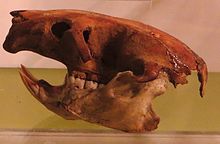| Canariomys Temporal range: Pleistocene to Holocene
| |
|---|---|

| |
| Skull of Tenerife giant rat at Museo de la Naturaleza y el Hombre | |
| Scientific classification | |
| Domain: | Eukaryota |
| Kingdom: | Animalia |
| Phylum: | Chordata |
| Class: | Mammalia |
| Order: | Rodentia |
| Family: | Muridae |
| Tribe: | Arvicanthini |
| Genus: | †Canariomys Crusafont-Pairó & Petter, 1964 / Lopez-Martinez & López-Jurado, L. F. (1987) |
| Species | |
Canariomys is an extinct genus of rodents (Old World rats and mice) that once existed on the islands of Tenerife and Gran Canaria, part of the Canary Islands, Spain. These giant rats could reach a weight of about 1 kg (2.2 lb). They were herbivores; their diet was based on plant materials, probably soft vegetables such as roots, ferns, and berries, but not grass. C. tamarani were considered herbivores, eating everything plant-like except grass with good digging skills. While C. bravoi were considered as a rat character, because of its large size, with an omnivorous diet with good climbing skills. They were one of two groups of rodents native to the archipelago, alongside the lava mouse (Malpaisomys insularis), which was native to Fuerteventura and Lanzarote.
Original distribution
[edit]It is generally believed that the species of Tenerife lived in a wooded area linked to the laurisilva and that it had climbing abilities, whereas the species of Gran Canaria lived in more open environments and was more linked to the excavation of burrows.
Phylogeny
[edit]Two species are currently recognized, the Tenerife giant rat, (Canariomys bravoi), and the Gran Canaria giant rat (Canariomys tamarani). Both species lived in between the Pleistocene and Holocene epochs.
Both species became extinct around the beginning of the 1st Millennium, shortly after the first human settlement of the islands by the Guanches.[1]
Genetic evidence indicates that the genus is nested within Arvicanthis, specifically within the African grass rat (A. niloticus) species complex, with an estimated divergence from its mainland relatives around 650,000 years ago.[1]
References
[edit]- ^ a b Renom, Pere; de-Dios, Toni; Civit, Sergi; Llovera, Laia; Sánchez-Gracia, Alejandro; Lizano, Esther; Rando, Juan Carlos; Marquès-Bonet, Tomàs; Kergoat, Gael J.; Casanovas-Vilar, Isaac; Lalueza-Fox, Carles (2021). "Genetic data from the extinct giant rat from Tenerife (Canary Islands) points to a recent divergence from mainland relatives". Biology Letters. 17 (12): 20210533. doi:10.1098/rsbl.2021.0533. PMC 8692034. PMID 34932923.
- Crusafont-Pairo, M.; Petter, F. (1964). "Un muriné géant fossile des îles Canaries: Canariomys bravoi gen. nov., sp. nov. (Rongeurs, Muridés)". Mammalia. 28 (4). doi:10.1515/mamm.1964.28.4.607. S2CID 84500531.
- Michaux, Jacques; Hautier, Lionel; Hutterer, Rainer; Lebrun, Renaud; Guy, Franck; García-Talavera, Francisco (October 2012). "Body shape and life style of the extinct rodent Canariomys bravoi (Mammalia, Murinae) from Tenerife, Canary Islands (Spain)". Comptes Rendus Palevol. 11 (7): 485–494. Bibcode:2012CRPal..11..485M. doi:10.1016/j.crpv.2012.06.004.







